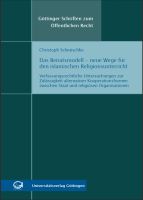Das Beiratsmodell - neue Wege für den islamischen Religionsunterricht
Verfassungsrechliche Untersuchungen zur Zulässigkeit alternativer Kooperationsformen zwischen Staat und religiösen Organisationen
| dc.contributor.author | Schmischke, Christoph | |
| dc.date.accessioned | 2018-03-01 23:55:55 | |
| dc.date.accessioned | 2019-11-28 13:50:13 | |
| dc.date.accessioned | 2020-04-01T12:50:22Z | |
| dc.date.available | 2020-04-01T12:50:22Z | |
| dc.date.issued | 2018 | |
| dc.identifier | 647430 | |
| dc.identifier | OCN: 1038435021 | en_US |
| dc.identifier.uri | http://library.oapen.org/handle/20.500.12657/30277 | |
| dc.description.abstract | Religiöse Erziehung von Muslimen findet in muttersprachlichem Ergänzungsunterricht oder in den Koranschulen der Moscheegemeinden statt. Dies hemmt die Entwicklung eines überpartikularen, im deutschen Schul- und Wissenschaftssystem beheimateten Islam. Die Idee eines islamischen Bekenntnisunterrichts an öffentlichen Schulen in deutscher Sprache findet über Parteigrenzen hinaus breite Zustimmung. Das Problem: Das Grundgesetz sieht eine Kooperation zwischen Staat und Religionsgemeinschaft vor. Islamische Organisationen sind aber (noch) nicht als Religionsgemeinschaften anerkannt. Wer soll dann die Lerninhalte festlegen? Behörden islamischer Herkunftsstaaten sind ungeeignet. Sie transportieren die Vorstellung eines politischen Islam, der tief in den Prägungen der Heimatländer verhaftet ist. Die Schulministerien der Bundesländer sind der Neutralität verpflichtet und dürfen keine theologischen Gestaltungsaufgaben wahrnehmen. Beiräte, bestehend aus islamischen Theologen und Verbandsvertretern, könnten die Lösung sein. | |
| dc.language | German | |
| dc.subject.classification | thema EDItEUR::L Law | en_US |
| dc.subject.other | islamischen Religionsunterricht | |
| dc.title | Das Beiratsmodell - neue Wege für den islamischen Religionsunterricht | |
| dc.title.alternative | Verfassungsrechliche Untersuchungen zur Zulässigkeit alternativer Kooperationsformen zwischen Staat und religiösen Organisationen | |
| dc.type | book | |
| oapen.abstract.otherlanguage | Religious education of Muslims takes place in supplementary lessons in the mother tongue or in the Koran schools of the mosque communities. This inhibits the development of a supra-particular Islam that is at home in the German school and academic system. The idea of Islamic religious instruction in German at public schools is widely supported across party lines. The problem is that the Basic Law provides for cooperation between the state and the religious community. Islamic organisations, however, are not (yet) recognised as religious communities. Who, then, is to determine the content of the courses? Authorities of Islamic countries of origin are unsuitable. They convey the idea of a political Islam that is deeply rooted in the influences of the home countries. The school ministries of the federal states are obliged to neutrality and are not allowed to take on any theological formative tasks. Advisory boards consisting of Islamic theologians and representatives of associations could be the solution. | |
| oapen.identifier.doi | 10.17875/gup2017-1069 | |
| oapen.relation.isPublishedBy | ffaff15c-73ed-45cd-8be1-56a881b51f62 | |
| oapen.relation.isbn | 9783863953454 | |
| oapen.collection | AG Universitätsverlage | |
| oapen.identifier.ocn | 1038435021 |

